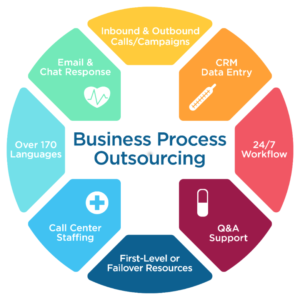Services
Business Process Outsourcing
We are a budding organization with clients all over the world. We have an established network in each state of North America ensuring efficient services to all our clients.

Our Core Services
Voice processes
- Inbound call services
- Outbound call services
- Telemarketing services
- Customer care services
- Technical Support

Non voice process
- Email support
- Chat support
- Data entry and Form filling
Our Services Include:
- A 24/7 service with excellent performance and quality in deliverables
- Ensuring that each call is treated with utmost care and ensure call quality.
- Ensuring that each call is treated with utmost care and ensure call quality.
- Evolve according to market trends and staying upto date on all core areas.
- State of the Art in house Technology
- Flexibility to clients
Value Add:
- High productivity
- High quality
- Great customer satisfaction
- Reduced TATs
- Reduce cost of hiring
- Reduce cost of operation
- Improve retention
- End to end customer life cycle management.
We Provide The Best Service In Industry
Add A Line That Tells Users How Easily They Can Get In Touch With You
Other services
Identity and Access Management
A guide to keeping the identity of your business in check.
As a business expands and scales, it adapts with applications to streamline its network and operations. Where an employee may have once had one email password, now IT manages dozens of credentials for SaaS platforms on multiple devices.
Knowing one security slip-up can be the end of business, identity access management solutions give IT the ability to manage access control and identity with the same speed and confidence for 10 employees as for 10,000. This frees them from time-consuming manual tasks – like password resets – and allows them to focus on more challenging, fulfilling projects to drive company growth.
What is Identity and Access Management?
Identity and access management, or IAM, is the process of codifying not only users and groups in a software system, but also what resources they are each able to access and what functions they are each able to perform. IAM addresses authentication, authorization, and access control.
IAM provides dynamic access without compromising security
Identity and access management grants users access based on the roles and permissions assigned to them. But IAM also allows bespoke access based on a user’s history, the risks they present, and the context in which they’re requesting the access.
With identity and access management, IT teams can create custom access policies for different user roles and groups. For instance, admin users connecting to internal databases over an unsecure network will be denied access. Meanwhile, an HR staff member who needs access to employee data will be prompted for an additional factor before gaining access. While this contextual access is incredibly sophisticated, busy teams and IT departments only need to know one thing — that it works.
Identity and access management eliminates complexity and enhances productivity
IAM reduces the complexities of access by organizing all access policies into a unified system. It enables a centralized, consistent, and scalable way of managing users, and makes granting permissions simpler and adopting new applications faster.
Instead of constantly resetting passwords and providing access to every application, IT admins can utilize the automated provisioning and Lifecycle Management tools that comes with identity and access management solutions. In turn, users need not wait because they have instant access to everything they need as soon as they’re onboarded, depending on their role, rather than requesting different tools and resources ad hoc. This means fewer demands on IT and more productivity overall.
Customer Relationship Management
In most cases, when people talk about CRM, they’re referring to a CRM system — a tool aimed at helping companies with sales, marketing and service management.
CRM software allows businesses to focus on their company’s relationships with customers, colleagues, suppliers, etc. With a professional CRM in place, it becomes much easier to find new customers, win their trust, provide qualified support, and provide additional services throughout the relationship.

CRM stands for “Customer Relationship Management” and refers to all strategies, techniques, tools, and technologies used by enterprises for developing, retaining and acquiring customers.
Who can benefit from CRM?
The best part about a CRM system is that almost any organizational unit can benefit from it — from sales and customer service to recruiting, marketing, and business development. Good CRM software gives a better way to manage external relationships.
Storing all customer information in one place, recording service issues, identifying sales opportunities, managing marketing campaigns — these are just a few capabilities that CRM features.
Since CRM provides easy access to data, it also becomes much easier for users to collaborate on different processes and increase productivity. Another strong argument in favor of CRM is that it is suitable for businesses of any size.
How does CRM work?
CRM solutions include functionalities that allow users to track customer and company interactions through various available channels. These channels include contact forms, emails, phone calls, and more.
CRM software provides sales and marketing teams with a set of tools to manage the entire sales and marketing funnel, from lead qualification to opportunity management, forecasting, and deal closure. It enables customer service teams to manage customer requests and automate service operations by following pre- defined processes for customer care excellence.
CRM systems are packed with tracking features that record numerous customer interactions online. In addition, CRM automates routine processes and provides managers with tools that allow for the tracking and measuring of the company’s performance and productivity. For example, CRM software can remind you of tasks that you need to complete at a given time. You can make it perform pre-scheduled activities like sending emails and initiating phone calls. Everything done with the CRM is recorded, giving you enough time to make better action plans to close any potential sale. Some CRMs also offer analytics capabilities, allowing users to track the efficiency of various marketing efforts to generate leads and conversions. The table below illustrates some of the features that Creatio CRM products provide. Take a look at them to get a better understanding of how CRMs work.
